2023 News
December 7, 2023
Our Global Economy: How to Move from Inequality to Shared Prosperity?
Thursday, December 14, 2023
6:00 a.m. – 11:00 a.m. EST
Location: Online and in-person at Thon Hotel EU, Brussels (12:00 p.m. – 5:00 p.m. CET)
Add to iCalendar
Add to Google Calendar
What are the root causes of economic inequality? How did it evolve since the golden sixties? Did it take new forms? What can and should we do about it? These are some of the key questions that will be addressed during this half-day conference. In the first part of the conference, leading academics will present research focused on various aspects of income and wealth inequality. A roundtable discussion on shared prosperity will follow the academic presentations.
This event is co-sponsored by the Georgetown University Global Economic Challenges Network, Centre for Economic Policy Research (CEPR), and Solvay Brussels School of Economics and Management (Université Libre de Bruxelles) – Public Policy House.
Featured
Micael Castanheira (panel moderator) is director for research of the Fonds National de la Recherche Scientifique and a professor of economics at the European Center for Advanced Research in Economics and Statistics, which is part of the Université Libre de Bruxelles. He is also a research fellow at the Centre for Economic Policy Research (CEPR). Castanheira obtained his Ph.D. in economics from the Université Libre de Bruxelles, and has been a post-doctoral fellow at Innocenzo Gasparini Institute for Economic Research (IGIER) at Bocconi University, Milan and a visiting scholar at New York University.
Paula Gobbi is a professor at the European Center for Advanced Research in Economics and Statistics and the Solvay Brussels School of Economics and Management at the Université Libre de Bruxelles and a research affiliate at the Centre for Economic Policy Research (CEPR). Gobbi was awarded the prestigious European Research Council starting grant in 2020. She holds a Ph.D. in economics from the Université Catholique de Louvain. Her research focuses on the economic determinants of fertility, gender issues, and intra-household decision models for childcare arrangements and has appeared in leading journals including the American Economic Review, the Journal of the European Economic Association, and the Economic Journal.
Chinhui Juhn is the Henry Graham Professor of Economics at the University of Houston. She is a research associate at the National Bureau of Economic Research and is slated to be president of the Society of Labor Economists from 2024 to 2025. Juhn has served as co-editor of the American Economic Review and contributed pioneering research on U.S. wage inequality. Her papers have examined the role of skill prices on the evolution of wage inequality, as well as the racial wage gap. She has written on family labor supply, earnings instability, and the impact of trade liberalization policies on gender inequality. Her work has been published in top journals such as the Journal of Political Economy, Quarterly Journal of Economics, and American Economic Review.
Luigi Pistaferri is the Ray Lyman Wilbur Professor of Economics at Stanford University and the Ralph Landau Senior Fellow at the Stanford Institute for Economic and Policy Research. He is also research associate of the National Bureau of Economic Research, the Centre for Economic Policy Research (CEPR), and Institute of Labor Economics (IZA). His research focuses mainly on household choices: consumption, saving, portfolio allocation, labor supply, and time use. His papers have appeared in the American Economic Review, Econometrica, the Review of Economic Studies, the Quarterly Journal of Economics, and the Journal of Political Economy among others. He was a co-editor of the American Economic Review from 2012 to 2017. In 2016 he was elected fellow of the Econometric Society.
André Sapir is professor emeritus at Université Libre de Bruxelles and senior fellow of Bruegel. He has worked for the European Commission as economic advisor to the director-general for economic and financial affairs from 1990 to 2001 and to president Romano Prodi from 2001 to 2004. Afterwards, he was external advisor to president José Manuel Barroso and member of the general board of the European Systemic Risk Board (ESRB), Europe’s financial stability oversight body 2011-2015. He has taught at the University of Wisconsin, the Graduate Institute in Geneva, the College of Europe in Bruges, and the University of Louvain, and was visiting fellow at the International Monetary Fund (IMF), the World Bank, and the World Trade Organization (WTO). Sapir has written extensively on European integration, international trade, and globalization. In 2004, he published An Agenda for a Growing Europe, a report by a group of independent experts that is known as the Sapir report. He received a Ph.D. in economics from the Johns Hopkins University in 1977.
Francis Vella (academic conference chair) is the Edmond V. Villani Professor at Georgetown University and a research associate of Centre for Microdata Methods and Practice (CEMMAP), Institute for Fiscal Studies (IFS), and Institute of Labor Economics (IZA). He is an elected fellow of the Econometric Society and the International Association for Applied Econometrics. He is a co-editor of the Journal of Applied Econometrics.
Margrethe Vestager is executive vice president of the European Commission for A Europe Fit for the Digital Age and Competition (currently on leave). She is the Danish government’s candidate for the position as president of the European Investment Bank. She previously served as commissioner for competition from 2014 to 2019, minister for economic affairs and the interior from 2011 to 14, and minister for education from 1998 to 2001 of Denmark. She was political leader of the Danish Social Liberal Party from 2007 to 2014, and has worked for the Danish Ministry of Finance from 1993 to 1995. Vestager holds a master of science in economics from the University of Copenhagen.
Gabriel Zucman is professor of economics at the Paris School of Economics, associate professor of economics at the University of California, Berkeley, and founding director of the EU Tax Observatory. He is the author of articles published in journals such as the Quarterly Journal of Economics, the American Economic Review, the Review of Economic Studies, and of two books. His research focuses on the accumulation, distribution, and taxation of global wealth and has renewed the analysis of the macroeconomic and distributional implications of globalization. Zucman was named an Andrew Carnegie Fellow in 2021, and received the John Bates Clark medal of the American Economic Association in 2023. He was awarded the Bernacer Prize and a Sloan Research Fellowship in 2019, the Best Young French Economist Prize by Le Monde and le Cercle des Economistes in 2018, and the Excellence Award in Global Economic Affairs by the Kiel Institute for the World Economy in 2017.
Schedule
6:00 a.m. – 9:30 a.m. EST (12:00 p.m. – 3:30 p.m. CET) | Academic Conference on the Multiple Facets of Inequality
• Chinhui Juhn, University of Houston, “Gender Inequality in Sorting into Top Jobs”
• Paula Gobbi, Université Libre de Bruxelles, “Inheritance, Demographics, and Economic Development”
• Luigi Pistaferri, Stanford University, “Assortative Mating and Wealth”
• Francis Vella (chair), Georgetown University
10:00 a.m. – 11:00 a.m. EST (4:00 p.m. – 5:00 p.m. CET) | Policy Roundtable and Q&A on Pathways to Shared Prosperity in Europe
• Margrethe Vestager, European Commission (currently on leave)
• André Sapir, Bruegel and Université Libre de Bruxelles
• Gabriel Zucman, University of California, Berkeley and Paris School of Economics
• Micael Castanheira (moderator), Université Libre de Bruxelles
November 14, 2023
Tianshi Mu awarded the 2024 Razin Prize
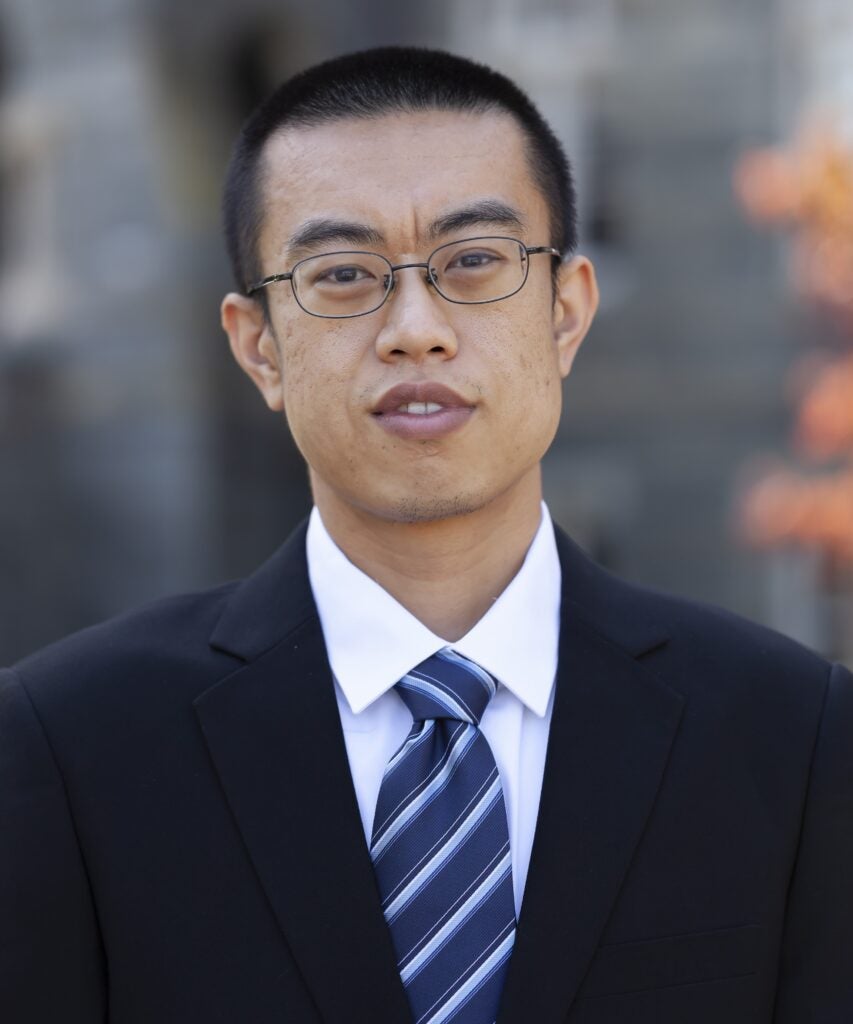
Congratulations to Georgetown University Economics PhD student, Tianshi Mu, who was awarded the 2024 Razin Prize.
Tianshi Mu’s paper entitled “The Dynamic Effects of Renewable Subsidies in the Green Energy Transition” was chosen as the best research paper in a very tough competition.
We also would like to extend our congratulations to Tianshi’s thesis advisors, Professor John Rust and Professor Nathan Miller.
Read more on the Razin Prize and Policy Lecture, its background, and history.
November 7, 2023
Conference on Aging
When: Friday, November 17, 2023
3:00 a.m. – 2:00 p.m. EST
Location: Online and Bank of Spain, Madrid (9:00 a.m. – 8:00 p.m. CET)
Many economies are confronting the economic and social realities accompanying an increasingly older population and workforce. While many of these factors are associated with funding retirement and pensions, there are also the social costs associated with the difficulties resulting from loss of professional identity and economic security, as well as the financial burden of providing and funding health care for the elderly.
This all-day conference will bring together some of the world’s leading experts on the economic issues related to aging. Eight academic presentations will address trends and drivers in the inequality of mortality; retirement security and health insurance; workforce aging, skill decline, and the organization of work; and a macro perspective on aging and growth. The presentations will be followed by a panel discussion moderated by Ángel Gavilán, director general for economics, statistics and research at the Bank of Spain.
In-Person Registration
Please register to attend the in-person event here.
Virtual Registration
Please register to watch the livestream here.
This event is co-sponsored by the Bank of Spain – Center for Monetary and Financial Studies (CEMFI) and the Georgetown University Global Economic Challenges Network.
Featured
Katharine G. Abraham is a distinguished university professor at the University of Maryland. She served as commissioner of the U.S. Bureau of Labor Statistics from 1993 through 2001 and as a member of the President’s Council of Economic Advisers from 2011 through 2013. She currently serves on standing academic advisory committees convened by the U.S. Congressional Budget Office, Bureau of Economic Analysis, and Federal Reserve Bank of Chicago. Abraham is a research associate of the National Bureau of Economic Research and a research fellow of the Institute for the Study of Labor (IZA), a member of the National Academy of Sciences and of the American Academy of Arts and Sciences, a distinguished fellow of the American Economic Association, and an elected fellow of the American Statistical Association and of the Society of Labor Economists.
James Banks is professor of economics at the University of Manchester and senior research fellow at the Institute for Fiscal Studies (IFS). He joined the IFS as a full-time research economist in 1990. While employed by the IFS he directed research into consumption and savings from 1992 to 1999, completed a part-time Ph.D. in economics at University College London (UCL), and served as deputy director of IFS from 1997 to 2002. In 2002 Banks became deputy research director of IFS and joined the economics faculty at UCL, where he was professor of economics. He moved to Manchester in 2010. He received his B.S. from Bristol and M.S. from the London School of Economics.
Tito Boeri is professor of economics at Bocconi University, Milan, and acts as scientific director of the Fondazione Rodolfo Debenedetti. He was senior economist at the Organization for Economic Co-operation and Development from 1987 to 1996. He was also a consultant to the European Commission, International Monetary Fund, International Labour Organization, World Bank, and the Italian government. Currently, Boeri is a research fellow at the Centre for Economic Policy Research, Institute for the Study of Labor, and Igier-Bocconi. He is the founder of the economic policy watchdog website Lavoce.info and VoxEU and the scientific director of the Festival of Economics.
David Canning is the Richard Saltonstall Professor of Population Science and professor of economics and international health in the Department of Global Health and Population at Harvard T.H. Chan School of Public Health. His research focuses on the role of demographic change and health improvements in economic development. Canning served as associate director of the Harvard Center for Population and Development Studies (HCPDS) from 2008 to 2017, where he was principal investigator on the Welfare Effects of Balancing the Federal Social Security and Health Care Budgets project.
Ángel Gavilán (panel moderator) is the director general for economics, statistics, and research at the Bank of Spain. He is a member of the executive commission of the Bank of Spain and alternate to the governor on the Governing Council of the European Central Bank. He is also a member of the Monetary Policy Committee of the European System of Central Banks. He has a Ph.D. in economics from the University of Chicago and began his professional career at the Bank of Spain in 2005. Between 2012 and 2016 he worked at Banco Bilbao Vizcaya Argentaria (BBVA). From 2016 to 2018 he was deputy head of the economics and market analysis division in the European Stability Mechanism (ESM). At the end of 2018 he rejoined the Bank of Spain as the head of the financial analysis division and executive coordinator and deputy director of the economic developments department.
Pablo Hernández de Cos (welcome remarks) is governor of the Bank of Spain and member of the Governing and General Council of the European Central Bank (ECB). He is chair of the Basel Committee on Banking Supervision, chair of the Board of Governors of the Center for Latin American Monetary Studies, and chair of the Advisory Technical Committee of the European Systemic Risk Board. He is member of various European and international committees including the ESRB, the Financial Stability Board, the Bank for International Settlements Group of Governors and Heads of Supervision, and the Advisory Board of the Financial Stability Institute. He is also vice-chairman of the Board of the Spanish Macroprudential Authority Financial Stability Board (AMCESFI). He holds a Ph.D. in economics from Complutense University in Madrid, a degree in economics and business studies from CUNEF, and a degree in law from Universidad Nacional de Educación a Distancia.
Carol Popper is professor of economics at Imperial College Business School in the Department of Economics and Public Policy. Between 2016 and 2019 she was also vice dean for faculty and research at Imperial College Business School. She is a past president of the Royal Economic Society. In 2021 she was a member of French President Emmanuel Macron’s expert commission on major economic challenges. In 2021 she was made a Dame Commander of the Most Excellent Order of the British Empire for her services to public health and economics; she previously was awarded a Commander of the Most Excellent Order of the British Empire for her services to social science in 2010. She is a fellow of the British Academy, the U.S. National Academy of Medicine, Centre for Economic Policy Research, and the Academy of Social Sciences.
Christopher J. Ruhm is a professor of public policy and economics at the University of Virginia. He received his doctorate in economics from the University of California at Berkeley in 1984. During the 1996-1997 academic year he served as senior economist on President Bill Clinton’s Council of Economic Advisers, where his main responsibilities were in the areas of health policy, aging, and labor market issues. He is currently a research associate in the health economics, health care policy, and children’s programs of the U.S. National Bureau of Economic Research and a research fellow at the Institute for the Study of Labor (IZA) in Germany.
Hannes Schwandt is an associate professor in the School of Education and Social Policy at Northwestern University, associate director at the Buehler Center for Health Policy and Economics at the Northwestern Feinberg School of Medicine, and a research associate at the U.S. National Bureau of Economic Research. His research has been published in leading economics, medical, and general science journals such as the Review of Economic Studies, Journal of the American Medical Association (JAMA), Science, and Proceedings of the National Academy of Sciences (PNAS), and his work is frequently covered by leading media outlets including the New York Times, the Wall Street Journal, and the Economist. In 2020, Schwandt was selected to Capital’s Top 40 Under 40 list, which recognizes Germany’s most important talents from business, politics, and science.
Andrew J. Scott is professor of economics at the London Business School, a research fellow at the Centre for Economic Policy Research, and a consulting scholar at Stanford University’s Center on Longevity. He was managing editor for the Royal Economic Society’s Economic Journal and non-executive director for the United Kingdom’s Financial Services Authority from 2009 to 2013. He has been an advisor on policy to a range of governments. He is currently on the advisory board of the United Kingdom’s Office for Budget Responsibility, the Cabinet Office Honours Committee (Science and Technology), co-founder of the Longevity Forum, a member of the National Academy of Medicine’s International Commission on Health Longevity, and the World Economic Forum council on Healthy Ageing and Longevity.
Schedule
9:00 a.m. – 9:30 a.m. | Welcome Remarks
• Pablo Hernández de Cos, Governor of Bank of Spain
9:30 a.m. – 11:00 a.m. | Session 1: Trends and Drivers in Inequality of Mortality
• Hannes Schwandt, Northwestern University, “The American Death Problem”
• Christopher J. Ruhm, University of Virginia, “Mortality Trends in the United States: the Roles of Education and Despair”
11:00 a.m. – 11:30 a.m. | Coffee Break
11:30 a.m. – 1:00 p.m. | Session 2: Retirement Security, Health Insurance
• James Banks, University of Manchester, “The Accumulation and Decumulation of Private Retirement Wealth: Policy Issues”
• Carol Popper, Imperial College, “Pension Reforms and National Health Service Doctors”
1:00 p.m. – 3:00 p.m. | Lunch
3:00 p.m. – 4:30 p.m. | Session 3: Workforce Aging, Skill Decline, and the Organization of Work
• Tito Boeri, Bocconi University, “Retirement, Aging and Migration: Connecting the Dots”
• Katharine G. Abraham, University of Maryland, “Self-employment at Older Ages”
4:30 p.m. – 5:00 p.m. | Coffee Break
5:00 p.m. – 6:30 p.m. | Session 4: The Macro Perspective: Aging and Growth
• Andrew J. Scott, London Business School, “A Longevity Economy”
• David Canning, Harvard University, “Policy Responses to Population Aging: a Welfare Approach”
6:30 p.m. – 6:45 p.m. | Break
6:45 p.m. – 8:00 p.m. | Panel Discussion
• Ángel Gavilán (moderator), Bank of Spain
September 14, 2023
Professor Laurent Bouton’s Research Cited
Prof. Bouton’s research on small campaign donors in the US has recently been featured in the New York Times. This research had previously been featured in The Economist and the Christian Science Monitor.
The research cited tries to answer various questions about the characteristics and behavior of small campaign donors, and how they differ from large donors. It relies on a new dataset built by Bouton and his co-authors, which covers the vast majority of donations for the period between 2005 and 2020, including small ones. The main findings are as follows. First, over the period of analysis, there has been a surge in both the number of small donors (who give less than $200 to any committee during a two-year electoral cycle) and their total contributions. Second, small donors are more representative of the electorate as a whole than large donors, both in terms of gender and ethnicity. Third, small donors appear less sensitive than large donors to factors such as the characteristics of the race (e.g., how close it is) and the characteristics of the candidates (e.g., whether the candidate is ideologically extreme or live in the same district). On the opposite, they react more positively to TV and targeted Internet ads, highlighting the importance of the strategic behavior of candidates to explain the behavior of small donors.
September 13, 2023
CEME Conference for Young Econometricians
GCER is very pleased to be hosting this year’s Conference on Econometrics and Mathematical Economics (CEME) for Young Econometricians on the 15th and 16th September in the McGhee Library in the Intercultural Center on the Georgetown University Main Campus. This workshop, managed by the National Bureau of Economic Research (NBER), has the express purpose of providing an informal venue for interaction between advanced junior and young senior Econometricians. The conference is supported by the National Science Foundation and Georgetown Center for Economic Research and this year it is being organized by Professors Tim Christensen (UCL), Matt Masten (Duke), and Alexandre Poirier (Georgetown).
The conference program can be found here.
April 24, 2023
GU Economics Professors Receive Honorary Degrees
Professors Jim Albrecht and Susan Vroman have been chosen to receive honorary degrees from Stockholm University. They will join eight other Professors to receive this year’s honor. An honorary doctorate is an expression of the University’s appreciation of outstanding contributions in one or more of the University’s areas of academic activity. The awarded honorary doctor should be affiliated with Stockholm University or have contributed to the University’s activities in some way. The honorary doctorates will be conferred at the Inauguration and Conferment Ceremony at the Stockholm City Hall, on Friday, September 29, 2023.
For more information, please click on the following link: https://www.su.se/english/news/ten-new-honorary-doctorates-at-stockholm-university-1.653991
April 21, 2023
Georgetown Undergraduate Economics student Awarded Fulbright Scholarship
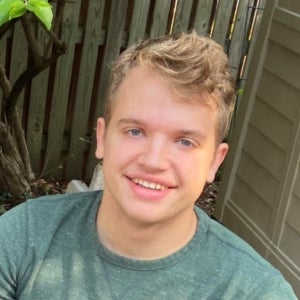
Neil Tracey, a double major in economics and government, was awarded a Fulbright scholarship to pursue a Master’s in Competition Policy at the University of East Anglia’s Centre for Competition Policy, the UK’s leading interdisciplinary institution focused on competition, regulation and consumer policy. Neil developed his interest in competition policy through his economics courses at Georgetown, including Industrial Organization and Topics in Competition and Regulation. He also worked as an Investigative Antitrust Reporting Intern at The Capitol Forum, a news outlet dedicated to covering regulatory issues.
March 24, 2023
Harvard Professor Raj Chetty will deliver the Razin Policy Lecture on March 24, 2023.
The Georgetown Center for Economic Research and the GU Economics Department are pleased to announce Professor Raj Chetty will deliver the 2023 Razin Lecture. The keynote lecture will take place on Friday, March 24, 2022 at 4:00 p.m. in the Riggs Library within Healy Hall at Georgetown University.
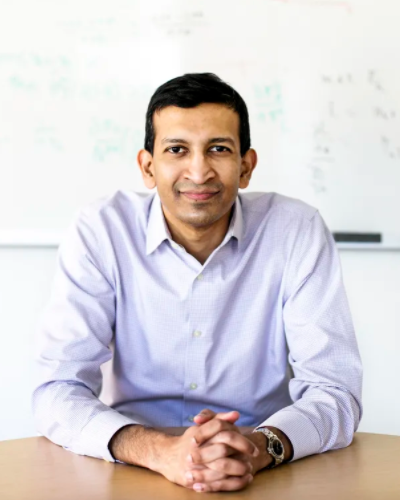
Raj Chetty is the William A. Ackman Professor of Economics at Harvard University and the Director of Opportunity Insights, which uses big data to study the science of economic opportunity: how we can give children from all backgrounds better chances of succeeding? Chetty’s work has been widely cited in academia, media outlets, and policy discussions in the United States and beyond.
Chetty received his Ph.D. from Harvard University in 2003 and is one of the youngest-tenured professors in Harvard’s history. He has received numerous awards for his research, including a MacArthur “Genius” Fellowship and the John Bates Clark medal, given to the economist under 40 whose work is judged to have made the most significant contribution to the field.
The Razin Lecture is accompanied by the awarding of the Razin Prize for best research paper by an advanced graduate student in Economics. The 2023 Razin Prize was awarded to Gretchen Sileo
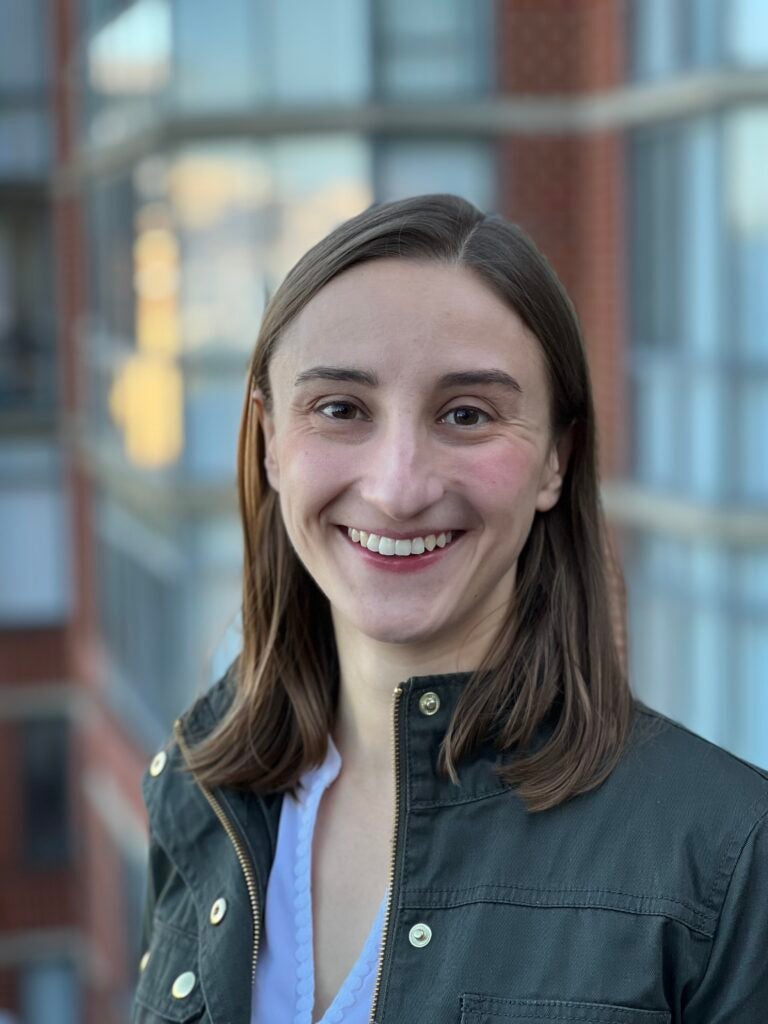
Gretchen Sileo’s paper entitled “Proactive and Reactive Infrastructure Investment” was chosen as the best research paper this year. We extend our congratulations to Gretchen’s thesis advisor, Professors John Rust and Nathan Miller.
Read more on the Razin Prize and Policy Lecture, its background, and history. The recording of the event and past Razin Lectures can be accessed by visiting our Georgetown University Economics YouTube Channel.
March 2, 2023
Rebuilding Ukraine-Principles, Policies, and the Role of the European Union?

Thursday, March 2, 2023
11:00 a.m. – 12:30 p.m. EST
Location: Online via Zoom
Registration Required
February 24, 2023 marks one year since the Russian invasion of Ukraine. The reconstruction of Ukraine cannot be about rebuilding the country to its pre-war state; rather, it should strive for a deep modernization of the country. All critical elements of the economy and society will have to undergo reforms to help Ukraine escape the post-Soviet legacy and become a full-fledged democracy with a modern economy, strong institutions, and a powerful defense sector. This presentation and discussion, based on the CEPR Paris Report: Rebuilding Ukraine: Principles and Policies (2022), will address opportunities and challenges in this effort.
Featured
Micael Castanheira (moderator) is director for research of the Fonds National de la Recherche Scientifique and a professor of economics at the European Center for Advanced Research in Economics and Statistics, which is part of the Université Libre de Bruxelles. He is also a CEPR research fellow. Castanheira obtained his Ph.D. in economics from the Université Libre de Bruxelles, and has been a post-doctoral fellow at Innocenzo Gasparini Institute for Economic Research (IGIER) at Bocconi University, Milan and a visiting scholar at New York University.
Yuriy Gorodnichenko is Quantedge Presidential Professor in the Department of Economics at the University of California, Berkeley. He received his B.A. and M.A. at Economics Education and Research Consortium at Kyiv-Mohyla Academy in Ukraine; his Ph.D. is from the University of Michigan. Gorodnichenko is broadly interested in macroeconomics and issues related to transition economies, especially labor markets and firm performance. He serves on many editorial boards, including the Journal of Monetary Economics and VoxUkraine.
Veronika Movchan is a research director at the Institute for Economic Research and Policy Consulting (IER) in Kyiv, Ukraine. Her main research interests are trade policy, including WTO- and EU-related issues, regional integration, non-tariff measures, and policy modelling. Movchan is an associated consultant at Berlin Economics GmbH, Germany, as well as a member of the VoxUkraine editorial board and Leibniz Institute of Agricultural Development in Transition Economies’ (IAMO) scientific advisory board. She holds an M.A. in economics from the National University Kyiv-Mohyla Academy in Ukraine and was a visiting research fellow at Stanford University.
Tymofiy Mylovanov is the president of the Kyiv School of Economics. His research interests cover areas such as theory of games and contracts and institutional design. During the Revolution of Dignity, jointly with other leading economists of Ukraine and the world, he founded the VoxUkraine platform aimed to increase the level of economic discussion in Ukraine. Mylovanov graduated from Kyiv Polytechnic Institute in 1997 and from Kyiv-Mohyla Academy in 1999, majoring in economic theory. In 2004 he received his Ph.D. in economics at the University of Wisconsin, Madison.
Alexander Pivovarsky is a director of the Capital and Financial Markets Development Department at the European Bank for Reconstruction and Development (EBRD). He joined the EBRD in 2008 as an economist. His career at the EBRD has included roles of deputy director in the president’s office, senior adviser in its corporate strategy department, and head of the bank’s resident office in Minsk, Belarus. Pivovarsky holds master’s and doctoral degrees in public policy from Harvard University and a diploma in history from Taras Shevchenko National University of Kyiv.
This event is co-sponsored by the Centre for Economic Policy Research, Solvay Brussels School of Economics and Management (Université Libre de Bruxelles) – Public Policy House, and Global Economic Challenges Network at Georgetown University.
February 28,2023
Announcement of 2022-2023 Distinguished Visitor Series
We are pleased to announce the following three prominent scholars will be the GCER Distinguished Visitors for the 2022-2023 academic year.

Hamish Low is the James Meade Professor of Economics at the University of Oxford and a Professorial Fellow at Nuffield College. He is also a Research Fellow at the Institute for Fiscal Studies. He holds a PhD in Economics from University College London, and an MPhil in Economics and a BA in Philosophy, Politics and Economics from the University of Oxford. His research agenda is focused on three connected sets of issues: first, what sort of uncertainty do individuals face over their life-times; second, how do individuals respond to this uncertainty; and third, what is the role of government, especially through social insurance, in mitigating this uncertainty. These issues are both microeconomic and macroeconomic, and are addressed using computer simulation and structural econometrics to model and estimate realistic economic environments. Hamish’s work has been published in leading economic journals including the American Economic Review and Econometrica.
Hamish will visit the economics department the week March 13-17.

Charles (Chad) Jones is The STANCO 25 Professor of Economics at Stanford Graduate School of Business and a research associate of the National Bureau of Economic Research. Professor Jones has been honored as a member of the American Academy of Arts and Sciences, a fellow of the Econometric Society, and a co-editor of Econometrica. He is noted for his research on long-run economic growth. In particular, he has examined theoretically and empirically the fundamental sources of growth in incomes over time and the reasons underlying the enormous differences in living standards across countries. In recent years, he has used his expertise in macroeconomic methods to study how race and gender contribute to economic growth, changes in top income inequality, and the economics of data.
Chad will visit the economics department the week of March 27-31.

Manuel Arellano is a Professor of Economics at CEMFI in Madrid. He has held appointments at the University of Oxford and the London School of Economics. He is a graduate from the University of Barcelona and holds a Ph.D. from the London School of Economics. He has served as Editor of the Review of Economic Studies, Co-Editor of the Journal of Applied Econometrics, and Co-Chair of the World Congress of the Econometric Society. He has also served as a member of the ERC Scientific Council. He is a Fellow of the Econometric Society and a Foreign Honorary Member of the American Academy of Arts and Sciences. He has been President of the Econometric Society (2014), President of the European Economic Association (2013), and President of the Spanish Economic Association (2003). He has published many research papers on topics in econometrics and labor economics, in particular on the analysis of panel data, being named a Clarivate Citation Laureate in Economics (2018). He is the author of Panel Data Econometrics (Oxford University Press 2003). He has received the Rey Jaime I Prize in Economics (2012) and the King of Spain Prize in Economics (2020).
Manuel will visit the economics department the week of April 17-21.
January 5, 2023
Honoring the Life and Career of Professor Martin Ravallion
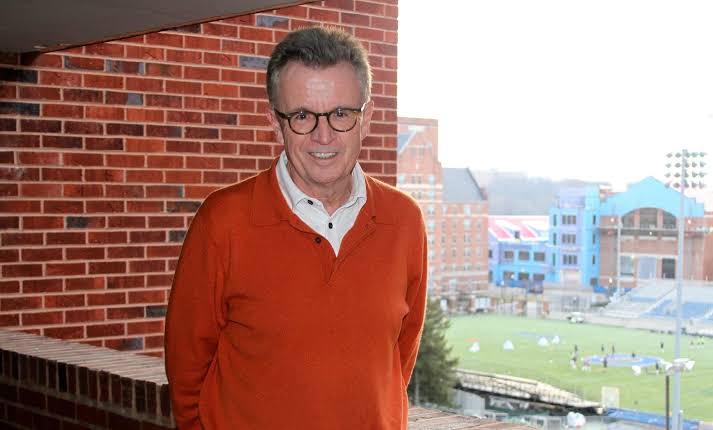
With extraordinary sadness, we announce the tragic passing of our colleague Professor Martin Ravallion on Saturday, December 24, 2022.
The following obituary was written by Professor Garance Genicot.
Professor Ravallion joined the department in 2013 as the Edmond D. Villani Professor of Economics after 24 years at the World Bank. Prior to joining Georgetown in 2013, he was the World Bank’s Acting Chief Economist after a long stint as the Director of the World Bank’s research department, the Development Research Group. He holds a Ph.D. in economics from the London School of Economics. In 2011 he received the John Kenneth Galbraith Award from the American Agricultural and Applied Economics Association. He won the 2015 BBVA Foundation Frontiers of Knowledge Award in Development Cooperation. In 2018 he was awarded an honorary doctorate in economics from the University of Fribourg, Switzerland.
Motivated by his experience and personal observations of poverty while growing up in Sydney, Australia, he became passionate about studying poverty: how to measure it and policies to alleviate it. His influence cannot be overstated. It is in great part thanks to Professor Ravallion that poverty is now a central topic for economists, policymakers, and the general public the world over.
Professor Ravallion’s pioneering research defined an internationally applicable threshold for poverty: the $1 a day poverty line adopted by the World Bank and then the United Nations. This work allowed comparisons of poverty levels across countries and regions resulting in international cooperation in the fight against poverty.
His scientific contribution was enormous. With more than 250 published articles and five books, Professor Ravallion was the most prolific of economists. He was a born educator. Passionate about his work, he loved educating the world about poverty and inequality: students, scholars, policymakers, politicians, and even Twitter followers.
At Georgetown, several generations of undergraduate students across the University had the good fortune to take Professor Ravallion’s popular class, the ‘Economics of Poverty.’ He was an amazing mentor to our Ph.D. students and colleagues.
Professor Ravallion is survived by his wife and co-author, Dominique van de Walle. His passing is a tremendous loss to all of us and the field of Economics.
The World Bank Blog published a more extensive obituary which can be found here.
